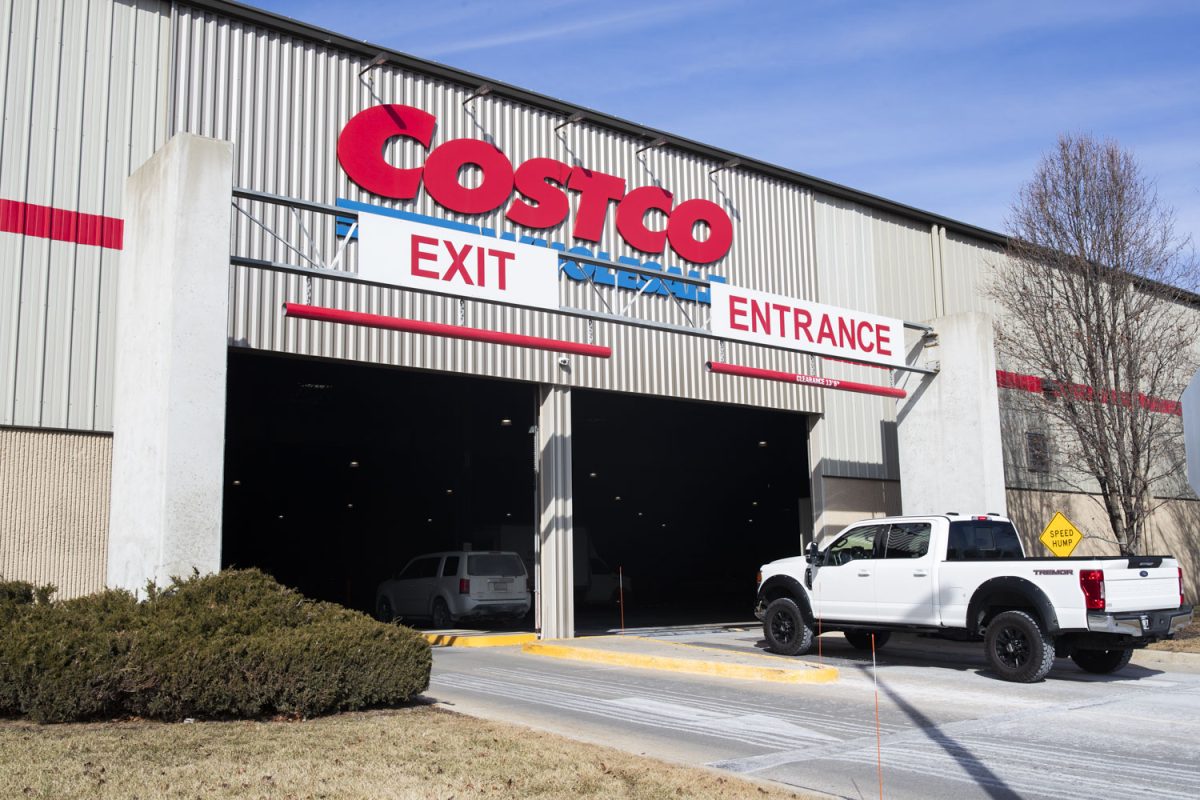Employees at the Coralville Costco launched a unionization effort with the Teamsters Local 238 in February, citing concerns over chronic understaffing, inconsistent scheduling, and alleged retaliation from management.
Sandy Burkey, an employee since 2018, said she and other employees began noticing changes following the COVID-19 pandemic. The Coralville store, she said, became chronically short-staffed, leaving employees with irregular and inconsistent schedules.
“We realize that the reason is because we’re lacking in the resources,” Burkey said. “But we’re in a multi-billion dollar company. So, why in the world are we lacking the resources?”
Burkey said she believes Costco’s leadership — including at the Coralville location — realized after the pandemic that the stores could operate with a minimal number of employees, allowing them to increase profits.
Ellie Heeren, who has worked at the Coralville Costco for over three years, said an incentive structure allegedly rewards department heads with bonuses for using fewer employee hours.
“Is [this incentive structure] irresponsible? Yes. Is it normal? Also, yes,” Heeren said. “This is just how capitalism works.”
While both Burkey and Heeren acknowledged their appreciation for the benefits Costco offers employees, Burkey said she was part of initiating the unionization effort when an increasing number of her co-workers began confiding in her about similar problems they experienced with the management structure. Those include issues with staffing, scheduling, and an alleged culture of favoritism toward certain employees.
“We can love our job, we can love Costco, and we can join a union,” Burkey said.
However, Burkey detailed what she described as a toxic work environment that management has perpetrated since the organization’s efforts began this winter.
“What they have done is pit people against each other and created this divide,” Burkey said. “It just feels like a civil war.”
Heeren said the conduct of the managers has also created a widespread fear of retaliation among employees who support the union.
“They’re watching people a lot more now,” Heeren said. “They’re not subtle about it, either.”
Burkey also described this alleged surveillance as fitting into a pattern she described as intimidation and union-busting tactics. Burkey alleged management at the Coralville Costco is violating employees’ rights under federal law by restricting the distribution of union materials in the break room during non-work hours, a practice protected by the National Labor Relations Act.
She said she and other organizers tried to post informational union literature in the employee break room and distribute it to co-workers in areas like the food court and parking lot. But, Burkey said, managers would repeatedly take down the posted materials or hover uncomfortably close while they were handing things out.
“I saw a manager literally take a flyer out of a person’s hand and say, ‘You’re not reading this,’ and throw it away,” Burkey said.
In this instance, Burkey said she confronted the manager and said it violated the employee’s rights.
“I was told something along the lines of, ‘Prove it,’” Burkey said. “It’s just a really difficult environment right now.”
As an alternative tactic, Burkey said she and other employees came up with the idea to place union flyers inside clear backpacks and hang them on the coat hooks in the break room — a way to make the materials visible and accessible without technically posting them.
“Literally within two hours of us doing that, [the backpacks] were missing,” Burkey said.
While she said she respects her co-workers’ views on the union — whether for or against — Burkey emphasized she just wants them to make an informed decision and that management’s actions have stifled that process.
“This is just an opinion, but it’s kind of a collective opinion — [they’re] lacking the educational materials to make an informed decision,” Burkey said of her co-workers who oppose unionization. “They’re just going off of the opinion of their general manager who has personal gain by talking them out of wanting a union.”
Burkey believes contributing to the alleged union-busting tactics are the managers becoming out of touch with the lived reality of the employees.
“Our general manager [will] talk about how much money he was making and how much he was able to save, knowing that there’s a person that works for us that’s homeless in the room,” Burkey said. “It was like, how out of touch are you?”
When U.S. Sen. Bernie Sanders, D-Vermont, kicked off his “Fighting Oligarchy” tour in Iowa City in February, Burkey was one of the speakers who presented before Sanders’ speech.
“It was really good. And I hope that other people just get motivated and get hopeful,” Burkey said.
In order to unionize, employees must first gather support and file a petition with the National Labor Relations Board, which then oversees a formal election process. While Burkey said she could not disclose details about when employees will vote on the union, she said she remains optimistic.
“Things are pretty far along, and we anticipate having the vote in the near future,” Burkey said.
Kim Graybill, assistant general manager at the Coralville Costco, declined The Daily Iowan’s request to comment.



